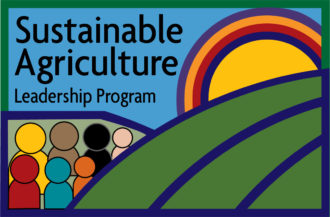GRIFFIN, Georgia - Historically underserved farmers and ranchers face a myriad of challenges in agriculture. From lack of access to land, to issues in technology, to concerns regarding family matters and health, underserved farmers and ranchers struggle to remain profitable, while supporting their communities.
Community leaders, whether they are individual farmers/ranchers, farmer groups, or non-governmental organizations that support those underserved farmers and ranchers, strive to create ag community resiliency and vitality in the face of those challenges.
In recognition of those contributions, Southern Sustainable Agriculture Research and Education (SSARE), has created the Equity and Prosperity Sustainable Agriculture Leadership Program.
The program, operated by Southern SARE’s Equity and Prosperity Committee, champions the leadership contributions of historically underserved farmers and ranchers and non-governmental organizations that serve those audiences within the Southern region.
Through the program, historically underserved farmers and ranchers, ag professionals and community leaders are highlighted for their tireless efforts in supporting minority and socially disadvantaged farmers and ranchers, beginning farmers and ranchers, military veterans and women farmers.
Program participants also receive sponsorship support to conduct education and training activities in areas of sustainable agriculture specifically targeted to historically underserved farmers and ranchers.
Sponsorship funds may also support program participants who want to attend a training to help emphasize sustainable ag aspects of their overall community efforts.
Who is Eligible
Historically underserved farmers and ranchers in leadership positions in their community, and farmer groups and NGOs who have demonstrated leadership contributions for historically underserved farmers and ranchers are eligible for the Equity and Prosperity Sustainable Agriculture Leadership Program.
Project Activity Funding Amount
The funding amount requested can be up to $3,000. Activities funded must be completed by January 31, 2023.
What the Funding Supports
Give Education/Training:
The sponsorship funds support education and training activities for historically underserved farmers and ranchers in areas of sustainable agriculture. Project activities can be in-person, or online (if COVID-19 restricts in-person activities). Activities can include, but are not limited to farmer field days, “how-to” demonstrations on sustainable ag topics, curriculum development, training manuals, webinars, and online trainings and workshops.
Topics must pertain to sustainable agriculture. They can include issues related to heirs property, education and training resources; safety and health; market challenges; food access; disaster recovery; access to technology; and stress and mental health.
Get Education/Training:
Sponsorship funds may also support program participants who want to attend a training related to their overall community efforts. The training topic must relate to sustainable agriculture.
Program Evaluation
In order to evaluate the effectiveness of the project activity, program participants will be asked to provide evaluation materials at the conclusion of their project. This can include a video, an impact report, or other evaluation documents.
Program Recognition
In addition to funding support, Southern SARE will recognize those participating in the program through a series of communications materials. These materials can include videos, photos, podcast interviews, press releases, and other communications efforts that will enable program participants to share their stories and share their project activity with the greater sustainable ag community across the Southern region.
Published by the Southern Region of the Sustainable Agriculture Research and Education (SARE) program. Funded by the USDA National Institute of Food and Agriculture (NIFA), Southern SARE operates under cooperative agreements with the University of Georgia, Fort Valley State University, and the Kerr Center for Sustainable Agriculture to offer competitive grants to advance sustainable agriculture in America's Southern region. USDA is an equal opportunity employer and service provider. Any opinions, findings, conclusions, or recommendations expressed in this publication are those of the author(s) and do not necessarily reflect the view of the U.S. Department of Agriculture.
